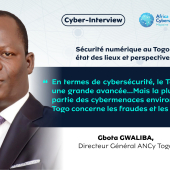Security of African critical infrastructures: from strategy to action
In an increasingly interconnected world, cybersecurity has become a key pillar of national security and economic growth, particularly in Africa where digital transformation is accelerating. We had the opportunity to speak with Abdelrahman Al Musfir, Regional Cybersecurity Officer for the Middle East and Africa at Schneider Electric, about this topic.
In this interview, he highlights the importance of collaboration, innovation, and public-private partnerships to strengthen Africa’s cyber resilience, especially in critical infrastructure sectors, while also addressing specific challenges such as limited connectivity, tight budgets, and the shortage of skilled professionals. In this conversation, he also reflects on these specific challenges, including limited connectivity, tight budgets, and the lack of specialized talent.
Africa Cybersecurity Mag : Your presence at the Cyber Africa Forum. You attended the Cyber Africa Forum this year. What is the main message you want to share in Cotonou, especially with government and industry leaders in Africa?
Abdulrahman Al Musfir : This shows that the leadership, business leaders, and government leaders within Africa understand that cybersecurity is no longer optional. It's a core pillar of national security and economic growth as well. We need to invest in collaboration, talent, and infrastructure to strengthen our cybersecurity resilience beyond and above, and make sure that it's a shared responsibility across all sectors.
Africa Cybersecurity Mag : As a Regional Cybersecurity Officer at Schneider Electric, how do you see the concurrent trade tagging IoT system, and how are you helping improve cyber resilience in critical infrastructure across the region?
Abdulrahman Al Musfir : IoT cybersecurity has its own threats. When it comes to IoT cybersecurity, we are speaking about obsolete systems and unpatched systems. We are also being targeted by state-sponsored attacks, which makes it very critical and sensitive when it comes to the national economy. To strengthen the IoT cybersecurity posture within Africa, we are coming up with tailored defense segmentation and regional threat monitoring. Our goal is proactive protection and not only responding to cybersecurity incidents and recovering from them.
Africa Cybersecurity Mag : Schneider Electric works with many governments in infrastructure operations. What type of partnerships do you think are most important today to protect national and regional systems?
Abdulrahman Al Musfir : At Schneider Electric, in addition to what we do as a business, we are building trust with leading cybersecurity authorities and critical infrastructure operators within the region. That’s why we are working on Public-Private Partnerships (PPPs). For us to do that, we are collaborating with cybersecurity authorities, for example in the Middle East and Africa, helping them in writing standards, such as OT cybersecurity and supply chain security.
We are also contributing to different platforms, like the Global CyberSecurity Forum and the World Economic Forum, which serve as knowledge communities, issuing white papers and reports about cybersecurity, and also building trust. We are being transparent. For example, in Schneider Electric, we have something we call a transparency report, where we share what we do in terms of cybersecurity. This helps us keep a trust-based and transparent relationship with our customers and authorities in the region.
Africa Cybersecurity Mag : How does Schneider Electric adjust its cybersecurity solutions for Africa, where challenges like limited connectivity, tight budgets, or lack of cyber talent are common?
Abdulrahman Al Musfir : We need to empower different segments of business operators to see security as part of safety. We use real-world cases, scenarios, and studies to learn from each other and to build cultural growth within leadership modules, making cybersecurity a priority in organizational culture. That is why we have developed different initiatives to raise awareness.
For example, we designed a program called the Cyber Badge, which provides specific and customized training depending on the nature of the work, for both cyber and non-cyber professionals. The goal is to ensure that cybersecurity is embedded in everything we do: when you see something, say something
Propos recueillis par Christelle HOUETO, journaliste digital







